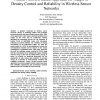Free Online Productivity Tools
i2Speak
i2Symbol
i2OCR
iTex2Img
iWeb2Print
iWeb2Shot
i2Type
iPdf2Split
iPdf2Merge
i2Bopomofo
i2Arabic
i2Style
i2Image
i2PDF
iLatex2Rtf
Sci2ools
136
click to vote
WCNC
2008
IEEE
2008
IEEE
Neural Network-Based Approach for Adaptive Density Control and Reliability in Wireless Sensor Networks
A primary constraint in wireless sensor networks (WSNs) is obtaining reliable and prolonged network operation with power-limited sensor nodes. Most of the approaches to the energy constraint problem focus mainly on the WSN and its architecture without analyzing the underlying process for the depletion of battery levels of individual nodes and consequent reduction in network lifetime: the variation of sensing environment in the deployment region. We study the energy model of a WSN as interdependence between the environmental variation and its impact on the energy consumption at individual nodes. This paper motivates the need for modeling energy variation in WSNs along with the environment in the deployment region. Defining network energy as the sum of residual battery energy at nodes, we provide an analytical framework for the dependence of node energy and sensitivity of network energy as a function of environmental variation and reliability parameters. Using a neural network based appr...
Related Content
| Added | 01 Jun 2010 |
| Updated | 01 Jun 2010 |
| Type | Conference |
| Year | 2008 |
| Where | WCNC |
| Authors | Renita Machado, Sirin Tekinay |
Comments (0)

